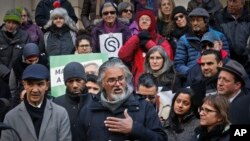Despite the Trump administration’s intensified efforts to increase immigration enforcement, opposition in some U.S. cities and states is slowing the process down, according to the results of a year-long study released Tuesday.
Immigration enforcement relies on a combination of federal, state and local law enforcement to identify and detain immigrants who are subject to deportation, like those in the country unlawfully or those who have arrest warrants.
With key immigration hubs like California challenging the Trump administration’s decisions with lawsuits, the number of arrests resulting from criminal custody at state and local jails and prisons dropped from 85 percent during the early years of the Obama administration to 69 percent during the first 135 days of the Trump administration, according to the report from the nonpartisan Migration Policy Institute.
The so-called “sanctuary” jurisdictions, which limit their cooperation with federal immigration officials to varying degrees, are contributing to an “unevenness in the enforcement landscape,” said MPI co-author Doris Meissner.
That is, enforcement will depend on “where (a person) is apprehended, not what he has done,” echoed Meissner’s colleague, Muzaffar Chisti.
Asked about the fear some immigrant communities are experiencing as a result of the increased enforcement, J. Thomas Manger, chief of police from Montgomery Country, Maryland a Washington, D.C. suburb where roughly one-third of residents are immigrants said that concern is a byproduct of the U.S. legal system.
“When we serve a search warrant on a house or an arrest warrant on an individual, it can be very scary. But it’s a lawful act that the court has authorized. We cannot say ‘we can't do this’ because it might frighten someone,” said Manger. “You've gotta find the right balance. You do it lawfully. You do it with everyone’s safety in mind. And you... try and treat people with dignity. That’s the best we can do.”
MPI reported that the “heightened climate of fear” is leading some immigrants to spend less, and seek out fewer services like health care and public benefits, and in some cities, to report crime less frequently.




